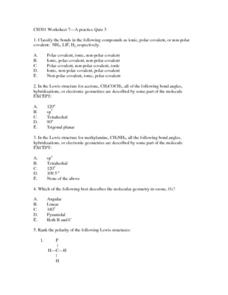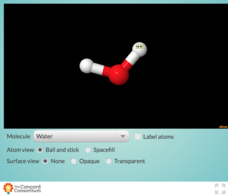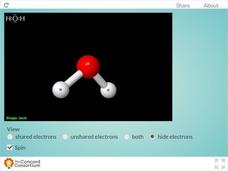LABScI
Atomic Structure and the Periodic Table of Elements: The Secret Agent Lab
Food always gets attention! Model atomic structure using fruit loops to represent the subatomic particles. After building models, scholars create ionic bonds using their models. Finally, they use these concepts to create a periodic table.
Curated OER
Review Questions-Molecular Geometry and VSEPR Theory
For this molecular geometry and VSEPR worksheet, students find bond angles, hybridization, determine polarity and draw orbital box diagrams of molecules. They determine molecular geometry and bond angles of given molecules and determine...
Curated OER
Molecular Architecture
High schoolers cuminate their study of molecular structure and bonding with this activity.
Curated OER
Molecular Modeling Activity
High schoolers explore the concept of molecular modeling and differentiate between saturated and unsaturated compounds. In small groups, they identify molecular formulas, complete a chart comparing alkanes, alkenes, and alkynes, and...
Curated OER
Worksheet 7 - A Practice Quiz 3
Every sort of chemical bond is touched upon during this assignment. Chemistry whizzes identify what type of bond is formed by analyzing chemical formulas or Lewis structure diagrams. Multiple choice questions also ask learners about...
Curated OER
VSEPR Theory: Valence Shell Electron Pair Repulsion Theory
In this atoms worksheet, students complete a graphic organizer by filling in the number of atoms, number of electron pairs, number of long pairs, bond angle, and molecular shape.
Science Geek
Basic Biochemistry - Carbohydrate, Protein and Fat
You are what you eat, right down to your molecular structure. A hearty presentation begins with the two types of carbohydrates, simple and complex. Then it details proteins and amino acids. It ends by reviewing the three types of fats,...
Science Geek
VSEPR and Molecular Geometry
Many chemistry jokes have no reaction. Presentation begins by explaining what models are and the limitations of various forms before introducing the VSEPR model. Then it outlines the rules for creating a VSEPR model and shows examples of...
Royal Society of Chemistry
Shapes of Molecules—Geometry of Central Atom
How is a molecule's shape determined? Explore bond angles, lone pairs, and VSEPR theory through a logic-based activity. Chemists pull together information about the major molecular shapes, then use it to solve puzzles.
Concord Consortium
Elements and Polarity
Take a look at some molecules that are so cool, they're polar! Scholars examine the effect polarity has on a molecule's shape and charge. Change up the view and choose between an opaque or transparent molecular surface, complete with...
Howard Hughes Medical Institute
Small-Molecule Diversity
One way to study the microscopic is to make it macroscopic. Each slide of the lesson presentation presents a different molecular model along with a brief description of the compound's function. Learners use the information to build...
Concord Consortium
Unshared Electrons and the "Bent" Shape
Why is water always so bent out of shape? Scholars investigate the molecular geometry of the water molecule using a 3-D resource. The interactive features options such as rotation and the ability to view electron pairs.
Concord Consortium
Making Molecules
It's molecule magic! Skillful scholars explore the effects of different atoms on molecular polarization using an intuitive interactive. The resource displays the charge at different locations on the molecule, then adapts as the user...
Curated OER
Bonding Theories
In this bonding worksheet, students fill in 8 blanks with the appropriate terms about theories of bonding, they determine if 6 statements are true or false, they match 5 terms with their meanings and they solve 1 problem related to...
Curated OER
WS 3.5 More Lewis Structures
In this Lewis structures worksheet, students draw molecular structures for twelve molecules. They determine the number of bonds in the molecular formula by following step by step directions given on the worksheet.
Teach Engineering
Density and Miscibility
The liquids did not mix — so what do density columns have to do with it? The seventh part in a series of nine provides the theoretical explanation of why density columns do not mix. The lesson covers the topics related to mixing and...
PhET
Molecule Shapes: Basics
In molecules, bonds rotate about the nucleus due to the repulsion of subatomic particles. In a simulation, learners manipulate the bonds of a molecule to meet the atoms' needs. They can then see the specific molecular shapes of five...
Curated OER
The Chemistry of Life
After studying the different aspects of atoms and their reactivity, pupils will find this summary PowerPoint useful for review. Some of the slides are informative with labeled diagrams; others give important vocabulary. Teachers may want...
Perkins School for the Blind
Building an Organic Molecule
Glucose is a simple sugar and a molecule that can be illustrated through modeling. Scientific investigators with visual impairments use hands-on models to reconstruct the process of bonding molecules. The tools used in this activity are...
PhET
Molecule Shapes
The shape of a molecule is determined by the arrangement of atoms around the central atom and lone pairs of electrons. Scholars build models of molecules using single, double, and triple bonds. They can then see real molecules bond...
Curated OER
How Are The Properties of Covalent Compounds Influenced By Chemical Bonding?
Students work together to observe the bond lengths of single, double and triple bonds. They make their own predictions about the strength of the bonds and chemical reactions. They answer discussion questions to complete the lesson.
Curated OER
Molecular Polarity
In this science worksheet, students solve problems that are related to the concept of molecular polarity. The answers to the problems are included.
Curated OER
Molecular Models
In this molecules worksheet, students use a molecular model kit to build a molecule, draw a 3-D structure and describe its shape. This worksheet has 2 graphic organizers.
Curated OER
The Ties that Bind
In this bonding worksheet, students read about the types of bonds that hold compounds together. They are given fifteen common materials and they identify the types of bonds that hold each together.

























